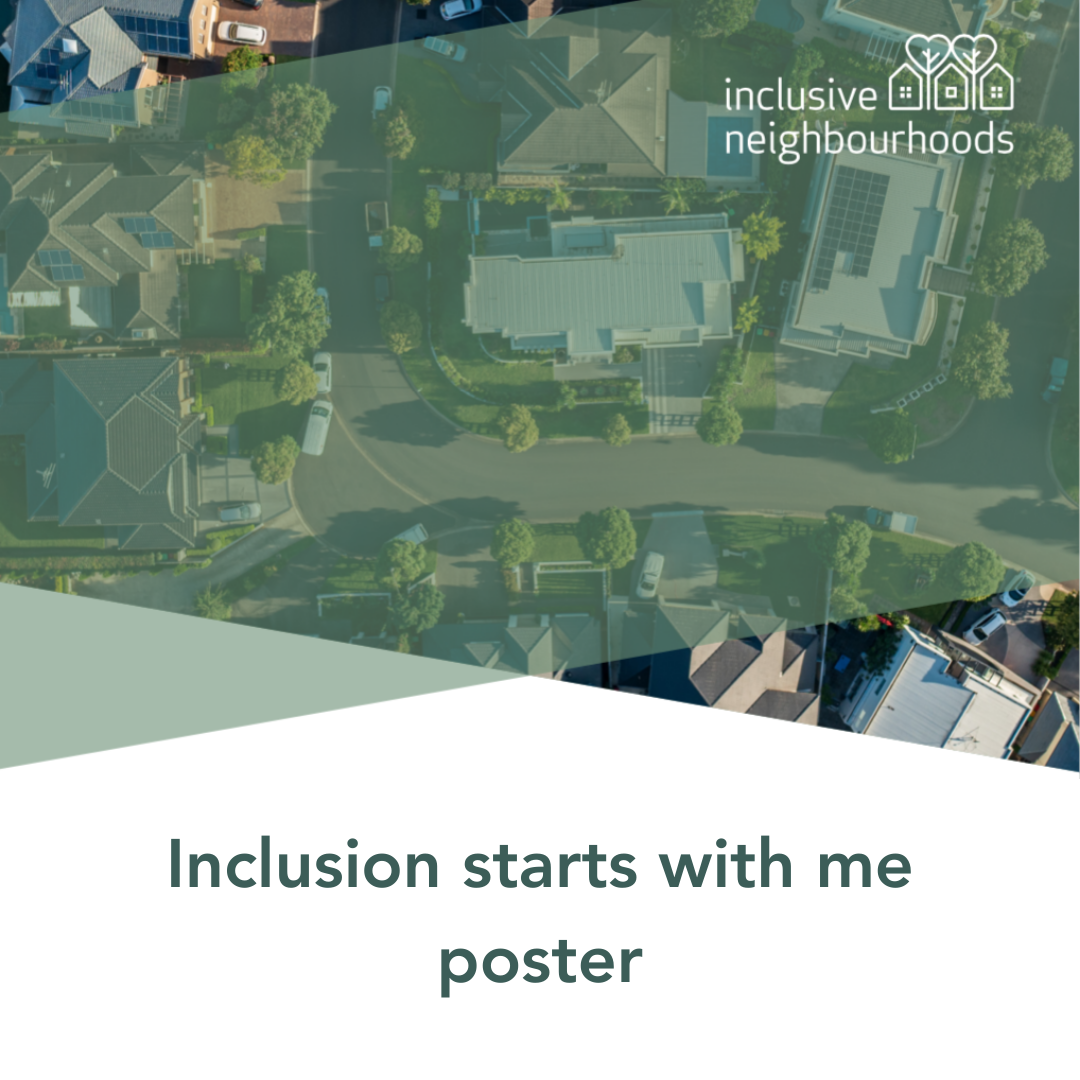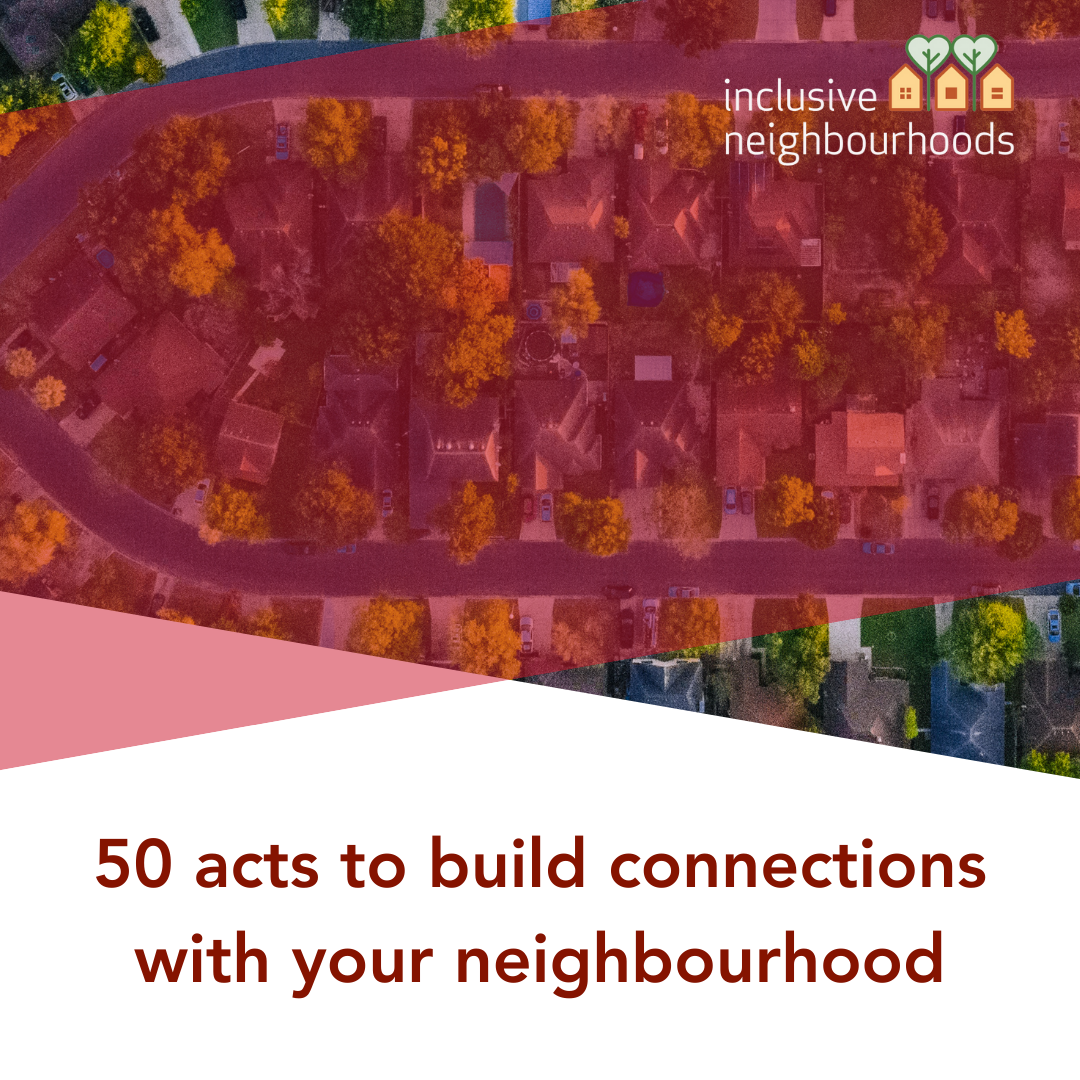Getting Started
While there is no one sized fits all approach to inclusion, there are some things we can think about to help make our neighbourhoods stronger sources of welcome and belonging. To support you with your inclusion journey we have developed the “Inclusion starts with me” and "50 acts to build connections with your neighbourhood" guides. These are posters that you can print out to put up in your office, center or home to help you build more inclusive neighbourhoods for the future.
WHAT IF YOU ARE SOMEONE WHO WANTS TO BE HELPFUL?
Do you want to be helpful and more connected to your neighbourhood and the people in it? Great!
But what’s the next step?
Most of us would have some experience with a situation like this: you see a person on your street or in your neighbourhood and something tells you they could do with some help. Maybe they seem lonely, maybe their garden needs some attention, or perhaps their letterbox is stuffed with letters because they’ve been away from home for a while, possibly even in hospital.
You want to help but there are things that are stopping you. For one, you don’t really know how to approach your neighbour or what to say to them. You also don’t want to look like you’re a sticky beak.
Your intentions are good, but you need a little help with what to do next.
So it’s time to bust some myths about what it takes to be a good neighbour.
Firstly, it’s completely normal to be unsure when you’re introducing yourself to a new person! But don’t let that stop you. The gesture of taking notice of your neighbour will be remembered far longer than the words you spoke.
Secondly, noticing someone may need help doesn’t mean you’re a sticky beak! It means you’re kind and conscientious and that you think about the people you share your neighbourhood with.
Now that we’ve busted those myths, here are some tips about what you can do to start an Inclusive Neighbourhood:
- Do a leaflet drop to the houses closest to you, introducing yourself and that fact that you really value having neighbours. You could offer to help your neighbours out or invite them over for a coffee.
- If you’ve noticed someone on your street who seems like they could do with some help, leave a note or a card in their letterbox introducing yourself or simply knock on their door and say hello. You could take something with you to help break the ice, like fruit or flowers from your garden.
- Organise a get together on your street and letterbox drop invites to all your neighbours.
WHAT IF YOU COULD BENEFIT FROM SOME HELP FROM YOUR NEIGHBOURS?
It doesn’t take something like COVID-19 for people to feel lonely. Even in a world where communication with vast amounts of people is literally at our fingertips, people are reporting feeling lonelier than ever.
What COVID-19 has shown us is that people want to help their neighbours. People want to be kind and they want to feel like they are part of a community.
If you feel like you could benefit from stronger relationships with your neighbours then these tips could help you break the ice:
- Have a look at our tips for being helpful in your neighbourhood. Offering to help someone is a great way to open up more opportunities for relationships with the people around you, and may even lead to other people offering to help you.
- Consider dropping a note in the letter boxes of your closest neighbours if there are particular things you need help with. For example, if it’s difficult to for you to get to the shops, you could ask if you neighbours would mind picking a few things up for you when they do their grocery shopping. You can work out the best way to organise payment with them directly.
- Think about whether you know someone else who would also like to feel more connected. There is truth to the saying “there’s safety in numbers”, and having even one other person with you as you seek to strike up new relationships will help you stay safe.
- Consider inviting people you know and trust to join a circle of support, where each person will be able to help you with things you’ve identified are tough to do on your own. (See our page on Circles of support for more information).
- Do some research about groups in your area that are already up and running. This website contains examples of in-person and online neighbourhood initiatives to help get you started.

